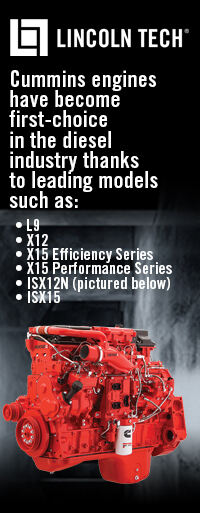Cummins Engines Are First Choice for the Trucking Industry

Look under the hood of one of the thousands of trucks traveling America’s highways each day, and you’re likely to find a Cummins engine. Cummins, a Fortune 500 company, celebrated its 100th anniversary in 2019 following a year that saw the organization generate more than $23 billion in worldwide sales. Operating in almost 200 countries, Cummins is a name recognized around the globe as a leader in the diesel engine industry.
“Cummins today is regarded as the industry leader in light, medium, and heavy duty diesel engines, as well as industrial diesel equipment,” says Robert Day, Education Supervisor at Lincoln Tech’s South Plainfield, NJ campus. “You’ll find Cummins engines in everything from trucks to tugboats – fans of ‘Deadliest Catch’ might even remember the Hillstrand family boat being rebuilt and outfitted with a Cummins.”
Prior to joining Lincoln Tech, Day worked for 23 years as a lead diagnostic technician at Cummins. His experience dates back to the mid-1980s, when electronic systems in diesel engines were just coming into prominence. Today, a typical engine might contain more than 30 different electronic systems that monitor and control everything from braking systems and fuel efficiency to lighting and navigation systems.
The Columbia, Indiana-based company’s network includes more than 600 distributors and 6,000 dealers. According to CSI Market, an independent digital financial media company, Cummins’ market share of the diesel engine sector topped 10% in the third quarter of 2019, and the company enjoyed a stock value increase of more than 35% during that time, compared to an average of 23% for their competitors1.
The Cummins CNG Engine is Clean Diesel Innovation

With truck manufacturers reaching near-record levels of production in recent years, Cummins has responded by generating a series of engines that are more powerful, and at the same time more efficient, than anything previously coming off its assembly lines. Last year the worldwide number of Class 8 diesel engines installed grew by roughly 25%, or 50,000 engines. Class 8s (like Freightliner, Kenworth, Peterbilt, and other brands of semi tractor-trailers) rely on models like Cummins’ X15, which was introduced in 2016, the L9 (2017), and the X12 in 2018. (Kenworth and Peterbilt – both owned by Fortune 500 company Paccar, Inc. – annually account for roughly two-thirds of Cummins’ total sales.) In 2020, the X15 portfolio will expand to include an Efficiency series expected to deliver better fuel economy with longer drain intervals.
One key area in which Cummins is helping set the industry standard are “clean” fuel systems – namely, Compressed Natural Gas (or CNG). Cummins’ popular ISX12N natural gas engine is among the types of equipment used for training in several Lincoln Tech Diesel and Truck Technology training programs. In 2018 Cummins cited CNG as a “proven technology with an established infrastructure”2 as it announced plans to increase its production of natural gas-driven engines. A recent report in Fleet Equipment magazine also highlighted a concept in development called Cummins’ Integrated System, which upgrades air handling and after-treatment components to provide greater efficiency and reduce harmful emissions of carbon dioxide and nitrogen oxides.
Cummins Engines Followed by Detroit Diesel, Volvo, Mack and Others
Cummins’ reputation is based on the quality and durability of its engines, and they’ve been able to build that reputation by focusing their business almost entirely on diesel engines and related equipment – fuel systems, air handling, emission control, and the like. Because of the company’s focus on one specialized area, Cummins engines have garnered a reputation for being the best, most reliable in the business. Competitors like Caterpillar, Volvo, Ford and Mack also produce widely-used models – but unlike Cummins, these companies feature engine production as one piece of a larger business model.
Another top name in the industry is Detroit Diesel Corporation. As recently as 2016, Detroit Diesel was one of just three manufacturers that combined to sell more than two-thirds of all medium and heavy truck engines (Cummins and Ford were the others). Until 2017, Detroit Diesel had held a slight lead over Cummins in Class 8 engine sales. Detroit Diesel Corporation is a subsidiary of Daimler Trucks North America (DTMA). DTMA recently entered into an agreement with Lincoln Tech’s South Plainfield campus to offer manufacturer-specific training to students via its online “Get Ahead” platform. Freightliner, another of the world’s leading engine makers, and the iconic Mercedes-Benz brand are also owned by DTMA.
Career Opportunities in the Diesel Engine Industry
The diesel industry is projected to add more than 13,400 positions across the country by 2028. This reflects the expected growth from 285,300 positions in 2018 to 299,100 positions by 2028, which is a steady 5% growth rate3. If you love the idea of building a career that relies on your ability to solve technical problems, then the diesel industry might be for you.
1 https://csimarket.com/stocks/compet_glance.php?code=CMI
2 https://www.cummins.com/news/2018/09/11/four-reasons-clean-diesel-cummins-toolbox-meet-climate-goals
3Bureau of Labor Statistics, U.S. Department of Labor, Occupational Outlook Handbook, Diesel Service Technicians and Mechanics, on the Internet at https://www.bls.gov/ooh/installation-maintenance-and-repair/diesel-service-technicians-and-mechanics.htm (visited January 09, 2020).
- Tags
- Cummins,
- Engine,
- diesel,
- clean diesel

